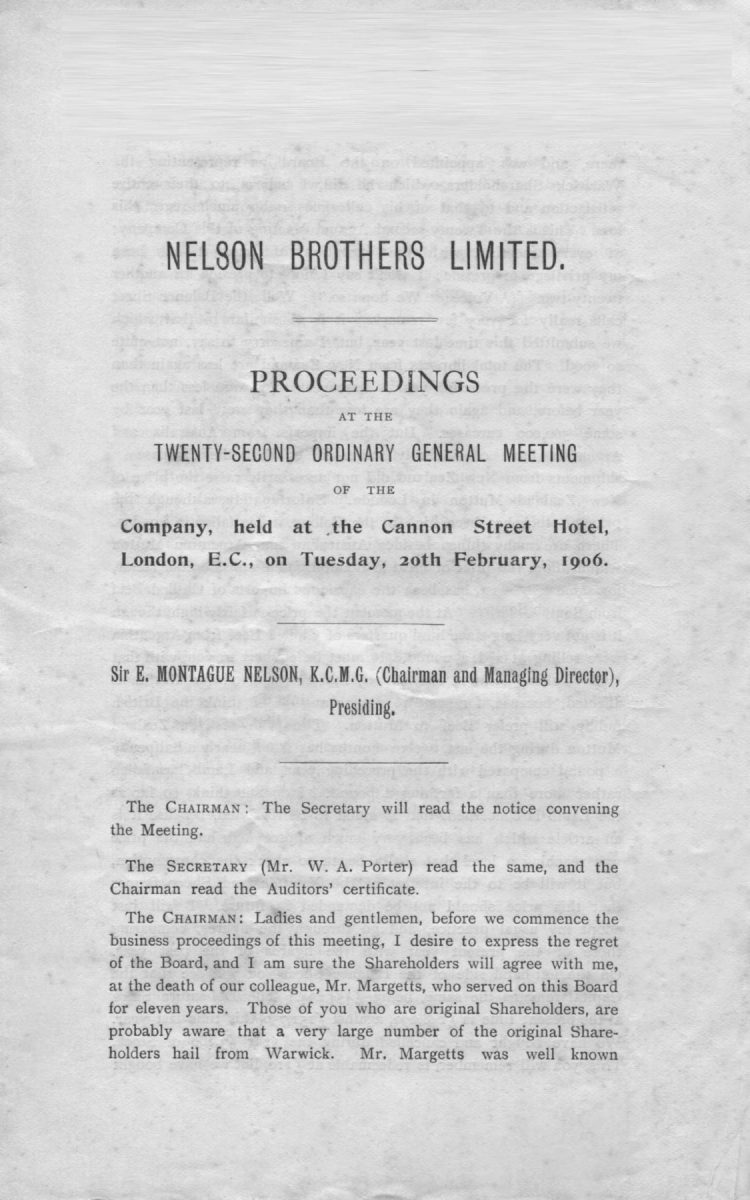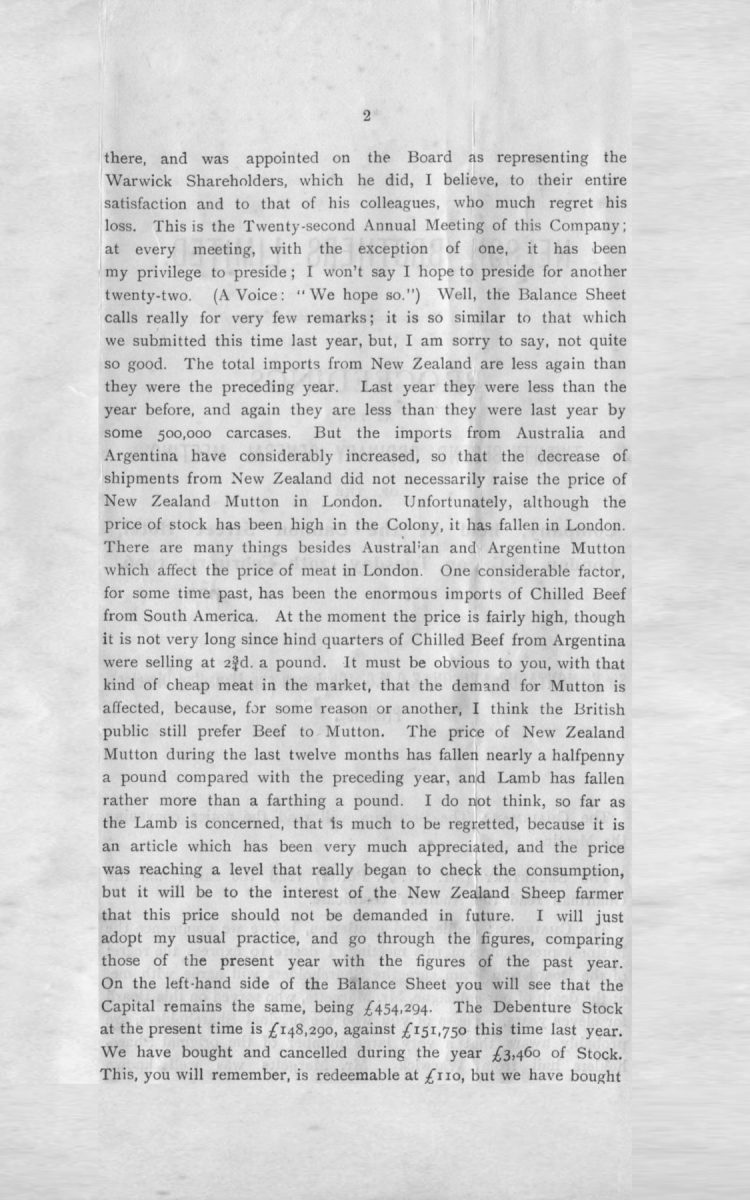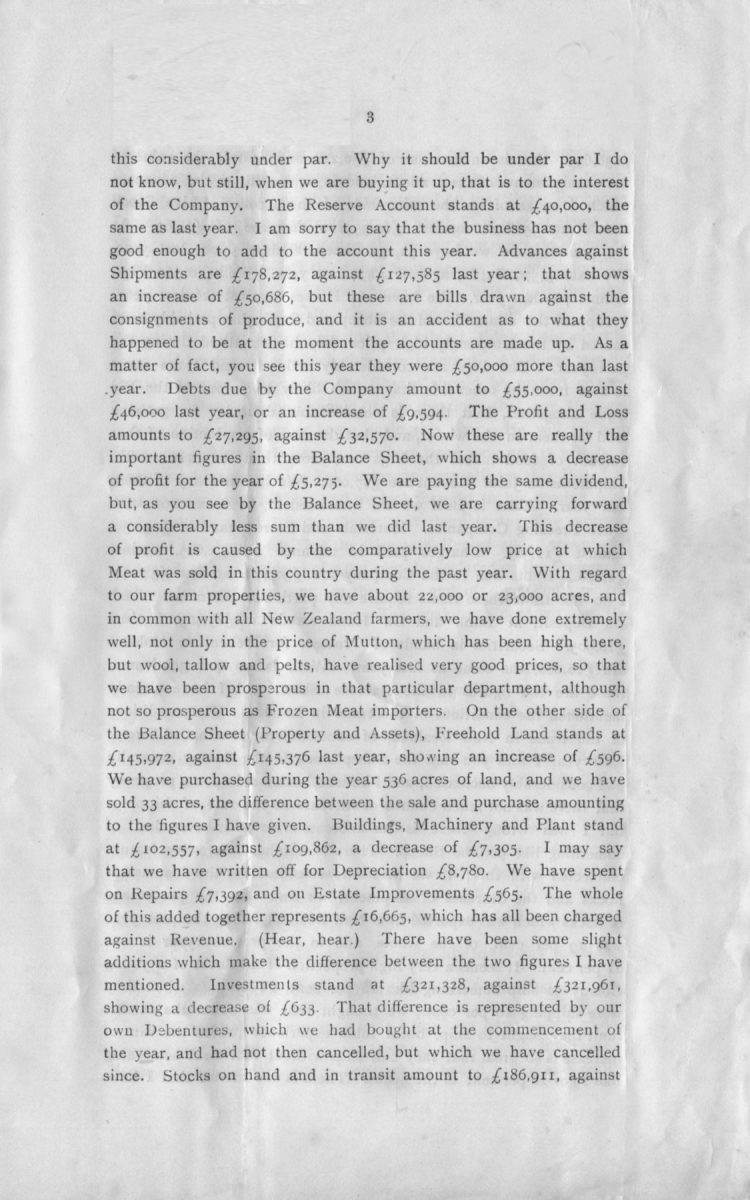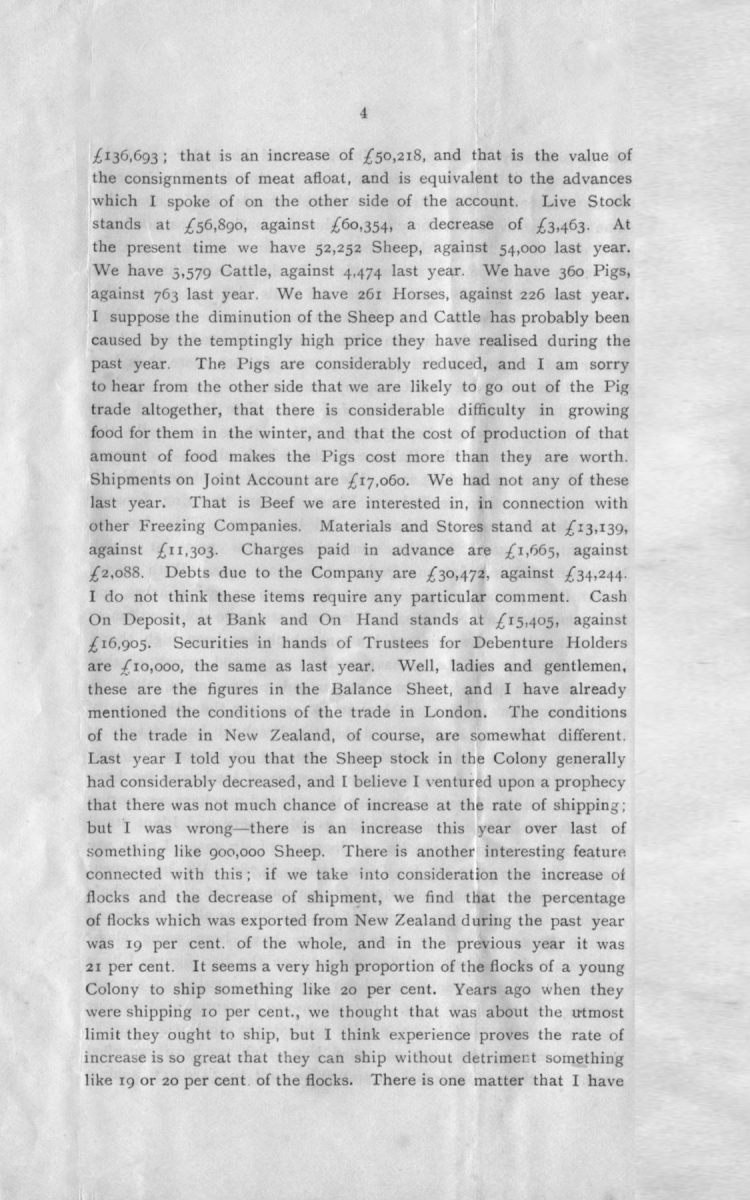- Home
- Collections
- WALMSLEY MJ
- Meat Works
- Nelson Brothers Limited Meeting Report 1906
Nelson Brothers Limited Meeting Report 1906
NELSON BROTHERS LIMITED.
PROCEEDINGS
AT THE
TWENTY-SECOND ORDINARY GENERAL MEETING
OF THE
Company, held at the Cannon Street Hotel, London, E.C., on Tuesday, 20th February, 1906.
Sir E. MONTAGUE NELSON, K.C.M.G. (Chairman and Managing Director), Presiding.
The CHAIRMAN: The Secretary will read the notice convening the Meeting.
The SECRETARY (Mr. W. A. Porter) read the same, and the Chairman read the Auditors’ certificate.
The CHAIRMAN: Ladies and gentlemen, before we commence the business proceedings of this meeting, I desire to express the regret of the Board, and I am sure the Shareholders will agree with me, at the death of our colleague, Mr. Margetts, who served on this Board for eleven years. Those of you who are original Shareholders, are probably aware that a very large number of the original Shareholders hail from Warwick. Mr. Margetts was well known

Page 2
there, and was appointed on the Board as representing the Warwick Shareholders, which he did, I believe, to their entire satisfaction and to that of his colleagues, who much regret his loss. This is the Twenty-second Annual Meeting of this Company; at every meeting, with the exception of one, it has been my privilege to preside; I won’t say I hope to preside for another twenty-two. (A Voice: “ We hope so.”) Well, the Balance Sheet calls really for very few remarks; it is so similar to that which we submitted this time last year, but, I am sorry to say, not quite so good. The total imports from New Zealand are less again than they were the preceding year. Last year they were less than the year before, and again they are less than they were last year by some 500,000 carcases. But the imports from Australia and Argentina have considerably increased, so that the decrease of shipments from New Zealand did not necessarily raise the price of New Zealand Mutton in London. Unfortunately, although the price of stock has been high in the Colony, it has fallen in London. There are many things besides Australian and Argentine Mutton which affect the price of meat in London. One considerable factor, for some time past, has been the enormous imports of Chilled Beef from South America. At the moment the price is fairly high, though it is not very long since hind quarters of Chilled Beef from Argentina were selling at 2¾d. a pound. It must be obvious to you, with that kind of cheap meat in the market, that the demand for Mutton is affected, because, for some reason or another, I think the British public still prefer Beef to Mutton. The price of New Zealand Mutton during the last twelve months has fallen nearly a halfpenny a pound compared with the preceding year, and Lamb has fallen rather more than a farthing a pound. I do not think, so far as the Lamb is concerned, that is much to be regretted, because it is an article which has been very much appreciated, and the price was reaching a level that really began to check the consumption, but it will be to the interest of the New Zealand Sheep farmer that this price should not be demanded in future. I will just adopt my usual practice, and go through the figures, comparing those of the present year with the figures of the past year. On the left-hand side of the Balance Sheet you will see that the Capital remains the same, being £454,294. The Debenture Stock at the present time is £148,290, against £I5I,750 this time last year. We have bought and cancelled during the year £3,460 of Stock. This, you will remember, is redeemable at £110, but we have bought

Page 3
this considerably under par. Why it should be under par I do not know, but still, when we are buying it up, that is to the interest of the Company. The Reserve Account stands at £40,000, the same as last year. I am sorry to say that the business has not been good enough to add to the account this year. Advances against Shipments are £178,272, against £127,585 last year; that shows an increase of £50,686, but these are bills drawn against the consignments of produce, and it is an accident as to what they happened to be at the moment the accounts are made up. As a matter of fact, you see this year they were £50,000 more than last year. Debts due by the Company amount to £55,000, against £46,000 last year, or an increase of £9,594. The Profit and Loss amounts to £27,295, against £32,570. Now these are really the important figures in the Balance Sheet, which shows a decrease of profit for the year of £5,275. We are paying the same dividend, but, as you see by the Balance Sheet, we are carrying forward a considerably less sum than we did last year. This decrease of profit is caused by the comparatively low price at which Meat was sold in this country during the past year. With regard to our farm properties, we have about 22,000 or 23,000 acres, and in common with all New Zealand farmers, we have done extremely well, not only in the price of Mutton, which has been high there, but wool, tallow and pelts, have realised very good prices, so that we have been prosperous in that particular department, although not so prosperous as Frozen Meat importers. On the other side of the Balance Sheet (Property and Assets), Freehold Land stands at £145,972, against £I45,376 last year, showing an increase of £596. We have purchased during the year 536 acres of land, and we have sold 33 acres, the difference between the sale and purchase amounting to the figures I have given. Buildings, Machinery and Plant stand at £102,557, against £109,862, a decrease of £7,305. I may say that we have written off for Depreciation £8,780. We have spent on Repairs £7,392, and on Estate Improvements £565. The whole of this added together represents £16,665, which has all been charged against Revenue. (Hear, hear.) There have been some slight additions which make the difference between the two figures I have mentioned. Investments stand at £321,328, against £321,961, showing a decrease of £633. That difference is represented by our own Debentures, which we had bought at the commencement of the year, and had not then cancelled, but which we have cancelled since. Stocks on hand and in transit amount to £186,911, against

Page 4
£136,693; that is an increase of £50,218, and that is the value of the consignments of meat afloat, and is equivalent to the advances which I spoke of on the other side of the account. Live Stock stands at £56,890, against £60,354, a decrease of £3,463. At the present time we have 52,252 Sheep, against 54,000 last year. We have 3,579 Cattle, against 4,474 last year. We have 360 Pigs, against 763 last year. We have 261 Horses, against 226 last year. I suppose the diminution of the Sheep and Cattle has probably been caused by the temptingly high price they have realised during the past year. The Pigs are considerably reduced, and I am sorry to hear from the other side that we are likely to go out of the Pig trade altogether, that there is considerable difficulty in growing food for them in the winter, and that the cost of production of that amount of food makes the Pigs cost more than they are worth. Shipments on Joint Account are £17,060. We had not any of these last year. That is Beef we are interested in, in connection with other Freezing Companies. Materials and Stores stand at £13,139, against £11,303. Charges paid in advance are £1,665, against £2,088. Debts due to the Company are £30,472, against £34,244. I do not think these items require any particular comment. Cash On Deposit, at Bank and On Hand stands at £15,405, against £16,905. Securities in hands of Trustees for Debenture Holders are £10,000, the same as last year. Well, ladies and gentlemen, these are the figures in the Balance Sheet, and I have already mentioned the conditions of the trade in London. The conditions of the trade in New Zealand, of course, are somewhat different. Last year I told you that the Sheep stock in the Colony generally had considerably decreased, and I believe I ventured upon a prophecy that there was not much chance of increase at the rate of shipping; but I was wrong – there is an increase this year over last of something like 900,000 Sheep. There is another interesting feature connected with this; if we take into consideration the increase of flocks and the decrease of shipment, we find that the percentage of flocks which was exported from New Zealand during the past year was 19 per cent. of the whole, and in the previous year it was 21 per cent. It seems a very high proportion of the flocks of a young Colony to ship something like 20 per cent. Years ago when they were shipping 10 per cent., we thought that was about the utmost limit they ought to ship, but I think experience proves the rate of increase is so great that they can ship without detriment something like 19 or 20 per cent. of the flocks. There is one matter that I have

Page 5
been asked to speak about. I have received one or two letters upon the subject, but I really do not know what to say. It is with regard to the price at which our Shares are quoted on the Stock Exchange. I think our £1 Shares are quoted on the Stock Exchange at about 15s. Well, to find that Shares giving the return that ours do should be quoted at such a price is a thing that I am unable to understand. It may be that purchasers of these things know more about the meat business than I do, but, really, I cannot understand the cause. Some Shareholders, who write to me upon the subject, think there must be some hidden reason of which they are ignorant. All I can say is, that I know no reason why the Shares should be quoted so low. There is one other thing I should like to mention – that our Manager in New Zealand is coming home again this year. He will be here some time in May. He has not been here since 1901, and it will be a very great advantage to my colleagues, and myself, on this Board to have an interview with him, and we look forward to his coming with very great pleasure. I do not know that there is anything more to add, and I will move: “ That the Directors’ Report and Accounts be “ adopted, that a Dividend of 3 per cent. be declared on the Preference “Shares, making 6per cent. for the year, and of 4 per cent. on the “Ordinary Shares, free of Income Tax, making 7 per cent. for the “ year.” (Applause.)
Mr. W. J. TAYLOR: Ladies and Gentlemen, I have great pleasure in seconding the resolution. I really do not know that there is anything I can add to it. I might sum it up in one sentence, and that is, that it might have been worse. I believe you can rely on the fact that your Board in London and your staff there, with the Manager in New Zealand and staff, are all ” Labour Members,” and it is not their fault that they are not able to put some money to reserve or to give you a bigger dividend. We, on this side of the table, all hold a large stake in the Company, and we would welcome an increase in dividend, as soon as we can pay it, but I do not think that any of us will pay it until we are able safely to do so. I have pleasure in seconding the resolution you have just heard. (Applause)
The CHAIRMAN: Would any Shareholder like to ask any questions?
A SHAREHOLDER: Are there any transactions in the Shares ?
The CHAIRMAN : There are a few; I think we have passed today about 1,000 Shares. There are two or three large holdings of deceased Shareholders, which trustees are bound to try and realise

Page 6
as speedily as they can; that might have an effect on the market. They are not forcing them on the market, but it may make a difference.
Mr. E. H. WILKINSON: You mentioned that the price of the Shares was about 15s., but I find that in yesterday’s Times the figure of 16s. was mentioned, and about a fortnight ago it was 16s. 6d. – 16s. 9d., so that we don’t want the figures to be worse than they really are. All I can say is, that these Shares at 16s. are very cheap.
The resolution was then put to the meeting, and carried unanimously.
The CHAIRMAN: It is my pleasing duty now to propose “That Mr. Rhodes Hawtyn Cobb be elected a Director of the Company.” I have spoken of the loss the Board has sustained by the death of Mr. Margetts, and the Directors have appointed Mr. Cobb to act in his place, and he comes before you for confirmation to-day. Mr. Cobb is a large Shareholder himself, and he is the son of a very large Shareholder. He was also a partner of one of the first Directors of this Company, Mr. Anning, who died a good many years ago, of the firm of Anning & Cobb. Mr. Cobb is a gentleman we know to be capable of giving his best attention and his useful knowledge connected with this business, and I am sure his services will be very valuable to this Company.
Mr. FREDERICK NELSON: I beg to second that resolution.
The motion was carried unanimously.
Mr. R. H. COBB: Ladies and Gentlemen, I thank you very much indeed for the honour you have done me, and I will do my best in the interests of the Company.
The CHAIRMAN: The next resolution is for the re-election of the Auditors, Messrs. Chatteris, Nichols & Co., at the fee of 100 guineas. Will some one from the other side of the table propose that?
Mr. CALKIN-LEWIS: I beg to propose the re-election of these gentlemen, at the usual fee of 100 guineas.
A SHAREHOLDERS I beg to second that.
This motion was also agreed to.

Page 7
Mr. TAYLOR: There is One duty which is always a great privilege and pleasure to me, and the way it has been received ever since I joined the Board, makes it a greater pleasure still. It is to propose that a vote of thanks, we will say this year, should be given to Mr. William Nelson on his arrival in this country, as he will probably have left the Colony by the time it gets out. The resolution is, that we pass a vote of thanks for the way in which the business has been conducted in New Zealand during the past year by Mr. Nelson and the staff. I would also include in the vote, our Secretary, Mr Porter, who is well-known to most of the Shareholders, and who, I believe, is able to answer any question connected with the business, except as to why our Shares are not at par. (Applause)
Mr. CALKIN-LEWIS: Mr. Chairman, I have much pleasure in seconding the proposition that has been made. I think we may add to it that we hope that Mr. William Nelson may have a very pleasant voyage to this country and a safe return. (Applause)
The motion was then put, and carried by acclamation.
The CHAIRMAN: That is all the business.
Mr. COBB, Senior: Ladies and Gentlemen, I beg to propose a cordial vote of thanks to the Chairman and Board of Directors. It is a great pleasure to come to these meetings, for we always hear from the Chairman such a concise account of the business and the prospects of the Company. The Directors conceal nothing, and we go away from the room knowing what our prospects are. We have an able Chairman, who gives us every information, and I beg to propose a hearty vote of thanks to him for his conduct in the Chair, and to the Board of Directors for their management of the business. (Applause)
Mr. ROBERTSON: I beg to second that.
The resolution was then put, and very heartily received.
The CHAIRMAN: Mr. Cobb, ladies and gentlemen, I would like first to say that the proposer of the resolution is the gentleman I spoke of as being one of our largest Shareholders, and it must be interesting to him to see his son now a member of the Board. (Applause) It is always gratifying to me to receive this vote of thanks. It is not down on the Agenda, but I must confess that

Page 8
I look for it as I have had it for so many years. (Hear, hear.) It has been gratifying to me also to have had the vote of thanks in bad years, as well as in good. It has been my unfortunate duty, sometimes, to say that we were very sorry that we could not pay any dividend, and I should think that no body of Shareholders, and certainly none with whom I am acquainted, have borne these times with greater patience and less dissatisfaction, than the Shareholders of Nelson Brothers. I omitted to mention just now, when I was talking about farming operations having been so successful, that there is one interesting thing which my brother wrote about the other day – that this past year, we have had a very wet winter. You have heard about floods in the past, and that a considerable amount of river work was carried out, by which it was thought these floods could be avoided. It is a satisfaction for us to know that that has been thoroughly effectual during the recent wet season. There have been no floods that have done any damage, and the only harm is the late season and the shearing delayed. But after all, we are accustomed to bad weather sometimes in this country, and we can understand there being a certain amount of inconvenience, though no great amount of loss from the rains they have had during the last winter, which is just over. I thank you most heartily, ladies and gentlemen, for your kind appreciation. (Applause) .
The proceedings then terminated.

Non-commercial use

This work is licensed under a Attribution-NonCommercial 3.0 New Zealand (CC BY-NC 3.0 NZ).
Commercial Use
Please contact us for information about using this material commercially.Can you help?
The Hawke's Bay Knowledge Bank relies on donations to make this material available. Please consider making a donation towards preserving our local history.
Visit our donations page for more information.
Subjects
Format of the original
LeafletDate published
1906People
- Rhodes Hawtyn Cobb
- Calkin Lewis
- Margetts
- Sir E Montague Nelson
- Frederick Nelson
- W A Porter
- W J Taylor
- E H Wilkinson










Do you know something about this record?
Please note we cannot verify the accuracy of any information posted by the community.